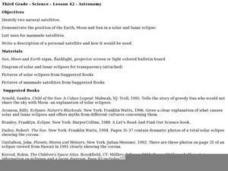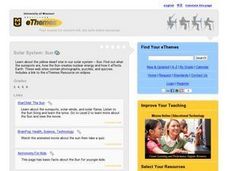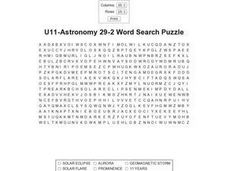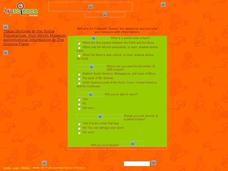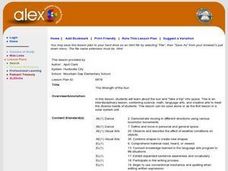Curated OER
An Overview of Solar Radiation
Students examine the Stefan-Boltzmann Law. Students compute basic radiative "constants" of the sun-Earth-atomosphere system. They examine the wavelength of maximum radiation emission.
Curated OER
Make a Sundial
Students explore space science by conducting a sun experiment in class. In this time telling lesson, students discuss how the sun sits in our sky at exact times each day and how astronomy is based on our perspective of the solar system....
Curated OER
Solar
Young scholars study solar energy. In this renewable energy lesson students complete several lab activities using different controls and variables.
Curated OER
Science - Lesson 42 - Astronomy
Third graders demonstrate the position of the Earth, Moon, and Sun in a solar and lunar eclipse. They list uses for manmade satellites and write a description of how a satellite would be use.
Curated OER
Sunscapes
Students share their observations of the Sun, then analyze images collected by NASA's Solar and Heliospheric Observatory. They create exhibitions for presentations.
Curated OER
The Discovery of the Solar System
Students study the ideas behind the heliocentric theory of Copernicus. They examine about retrograde motion of the planets as they move around the sun. They study astronomers who include Ptolemy, Copernicus, and Galileo.
Curated OER
Solar System: Earth
Students research Earth including what makes it suitable for life, its rotation, geological composition and gravity.
Curated OER
Solar System: Sun
Learners research information about the Sun, sunspots and how the Sun creates nuclear energy. They investigate how the Sun affects Earth.
Curated OER
Solar System: Uranus
Students research Uranus and its geological formation, atmosphere, magnetic field, satellites, and rings.
Curated OER
Astronomy 29-2 Word Search
In this science worksheet, learners locate and identify various vocabulary terms related to space science. There are 9 words/phrases located in the puzzle.
Curated OER
Curious? Will You Be Eclipsed?
In this "Curious? Will you be eclipsed?" worksheet, 4th graders answer 4 questions interactively about eclipses, then check answers online.
Curated OER
Spaced Out
Students explore the transit of Venus and the information that this minieclipse provides about the distance between the Earth and the sun. They create their own astronomical units.
Curated OER
Be A Planet
Students identify the name, order and attributes of the planets. They role play the position of planets, and draw pictures of the planets as well.
Curated OER
Exploring the Interstellar Medium
Students investigate the Interstellar Medium and the Local Bubble that the Sun is inside. They read and discuss a handout, answer discussion questions, observe a demonstration of light scattering, and conduct an experiment on the...
Curated OER
The Best of the Solar System (Grades 4-7)
Learners explore planetary research and become familiar with the planets and their characteristics. They compare and contrasts planets and moons.
Alabama Learning Exchange
The Strength of the Sun
Students explore the sun and take a "trip" to outer space.
Curated OER
Determining Red-Shift in a Receding Star
Learners practice manipulating algebra formulas with more than one variable. They examine the topics of velocity, wavelength and frequency. They determine the amount of red-shift in a receding star.
Curated OER
Mission Impossible! Are We Alone in the Universe, or Are We Just One of Its Citizens?
Students examine NASA strategy for scientifically studying any celestial body. They brainstorm about all previous space explorations and missions they can recall, and propose an expedition plan to become space explorers of the future.
Curated OER
Space Science: Constellations and the Sun
Students review the zodiac signs and illustrate their movement using constellations on the wall and themselves to represent earth. Individually or in groups, they stand in the center of the room while a shadeless lamp is placed between...
Curated OER
The Great Planetary Debate
Students' are given a research sheet to complete in small groups. They are to select a planet or moon to research using the Internet. With this research and their completed form, each group defends their planet or moon in a debate...
Curated OER
Phases of the Moon
Students use a simple physical model of the Earth, sun, and moon to understand why the moon changes phases from the perspective of Earthly observers. They hold up balls representing the moon in a room with a single light source to see...
Curated OER
Science: Planet Sizes
Young scholars compare planet sizes using class members holding fruit to represent the planets. They arrange the nine students in planetary order and compare and contrast the planets. Working in groups, young scholars color and...
Curated OER
Planetary Problem Solving
Students create their own planet. They determine its diameter, density, composition, mass and orbit. Students create a list of elements necessary to sustain human life. They present their model to the class.
Curated OER
Stellar Lunar Curriculum
Young scholars engage in a lesson that covers the concept of different phases of the moon. They name the cycles of the phases of the moon while using flashlights to simulate the light of the sun. They research information about several...
Other popular searches
- The Solar System Unit
- The Solar System Model
- Solar System and the Universe
- The Solar System Unit Plans
- The Solar System and Gravity
- The Solar System in One Page
- Solar System and the Galaxies





